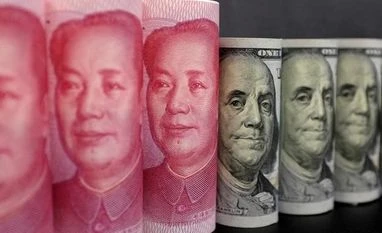China's forex reserves rose for the third month in a row in April, signalling eased capital flight pressure, official media in Beijing reported.
Forex reserves climbed to $3.0295 trillion at the end of April from $3.0091 trillion a month earlier, according to data released the People's Bank of China (PBOC).
This was the first time the reserves expanded for three months consecutively since June 2014.
The State Administration of Foreign Exchange predicted last month that the size of forex reserves would become more stable in the future as the economy maintains relatively fast growth and the country's current account surplus stays in a reasonable range, state-run Xinhua news agency reported in Beijing.
There had been growing concerns about capital flowing out of the Chinese market in the second half of 2016, when the economy was facing looming downward pressures and the Chinese yuan was in the middle of a losing streak against the US dollar.
In January, China's forex reserves declined below the closely watched 3-trillion-dollar mark for the first time since February 2011.
However, concerns about capital outflows have receded lately, with the Chinese economy on a firmer footing, supported by a string of upbeat data including industrial profits, factory activity and fixed-asset investment.
Forex reserves climbed to $3.0295 trillion at the end of April from $3.0091 trillion a month earlier, according to data released the People's Bank of China (PBOC).
This was the first time the reserves expanded for three months consecutively since June 2014.
More From This Section
The country's gold reserves also increased from $73.7 billion by the end of March to over $75 billion by the end of April.
The State Administration of Foreign Exchange predicted last month that the size of forex reserves would become more stable in the future as the economy maintains relatively fast growth and the country's current account surplus stays in a reasonable range, state-run Xinhua news agency reported in Beijing.
There had been growing concerns about capital flowing out of the Chinese market in the second half of 2016, when the economy was facing looming downward pressures and the Chinese yuan was in the middle of a losing streak against the US dollar.
In January, China's forex reserves declined below the closely watched 3-trillion-dollar mark for the first time since February 2011.
However, concerns about capital outflows have receded lately, with the Chinese economy on a firmer footing, supported by a string of upbeat data including industrial profits, factory activity and fixed-asset investment.
)